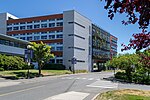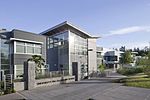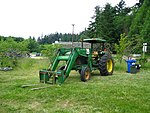UBC Botanical Garden

UBC Botanical Garden, at the University of British Columbia, was established in 1916 under the directorship of John Davidson, British Columbia's first provincial botanist. It is the oldest botanical garden at a university in Canada. The garden measures approximately 44 hectares (440,000 m2 / 110 acres) and includes over 8000 different kinds of plants. Visitors to the garden should expect to spend a minimum of one hour exploring the garden. Gardens include an Asian garden, an alpine garden, a native plants garden, a food garden and a physic (medicinal) garden. In 2002, the UBC Centre for Plant Research became the research arm of the UBC Botanical Garden. The Centre for Plant Research examines topics such as plant adaptation, genomics and phytochemistry. The Botanical Garden and the Centre for Plant Research are both encompassed by UBC's Faculty of Science. UBC Botanical Garden also administers the Nitobe Memorial Garden, a traditional Japanese garden located on campus.
Excerpt from the Wikipedia article UBC Botanical Garden (License: CC BY-SA 3.0, Authors, Images).UBC Botanical Garden
University Boulevard, Electoral Area A West Point Grey
Geographical coordinates (GPS) Address Website Nearby Places Show on map
Geographical coordinates (GPS)
| Latitude | Longitude |
|---|---|
| N 49.253333333333 ° | E -123.25 ° |
Address
University of British Columbia (UBC)
University Boulevard
V6R 3E9 Electoral Area A, West Point Grey
British Columbia, Canada
Open on Google Maps






